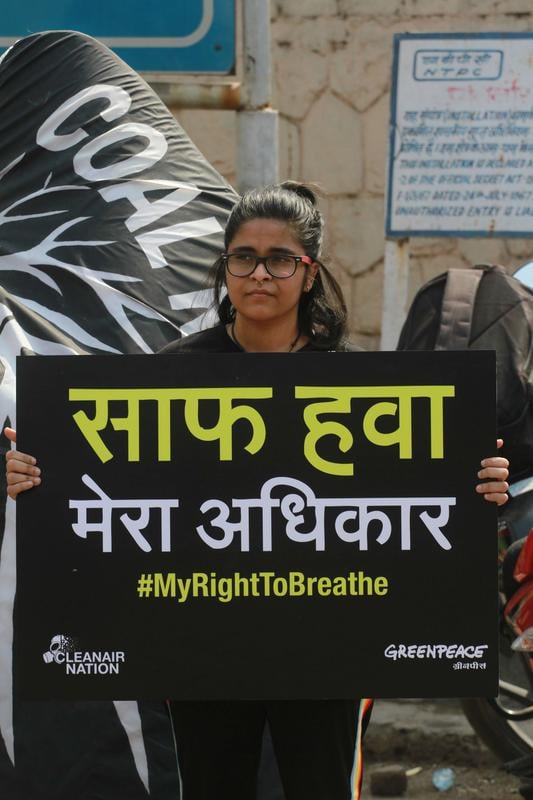(Improvement in air quality reiterates that change is possible however it need not be under drastic circumstance but a planned investment in public good can address the pollution crisis that exists throughout the year)
New Delhi, 11 April: Greenpeace India’s analysis of Central Pollution Control Board (CPCB) data reveals large scale reduction in air pollutant concentration during the first ten days of the lockdown period. PM 2.5 concentration in Delhi-NCR has reduced significantly by 55% to 67%. Earlier, this year in February, a report titled “World Air Quality Report 2019” was published by IQ Air Visuals revealed that 6 out of the top 10 most polluted cities are located in India.
Ghaziabad which happened to be the most polluted city in the world according to the report has witnessed 65.75% reduction in PM 2.5 concentration from March 24 to April 4, 2020 when compared with respect to the same period of 2019. Similarly, Delhi’s PM 2.5 dropped by 57.64%, Noida by 65.10%, Gurugram by 56.04% and Greater Noida by 68.83%.
| Rank Airvisual (2019) | City | Average of PM2.5 from 24th March to 4th of April) 2020 | Average of PM2.5 from 24th March to 4th of April) 2019 | % of reduction |
| 1 | Ghaziabad | 35.75μg/m3 | 104.40μg/m3 | 65.75% |
| 5 | Delhi | 35.92μg/m3 | 84.80 μg/m3 | 57.64 % |
| 6 | Noida | 29.80μg/m3 | 85.40μg/m3 | 65.10% |
| 7 | Gurugram | 30.41μg/m3 | 69.19μg/m3 | 56.04 % |
| 9 | Greater Noida | 26.98μg/m3 | 86.56μg/m3 | 68.83% |
| 10 | Bandhawani | NA | NA |
Last year during the same time period the air quality ranged between “Moderate” to “Unhealthy” and this year it has now been observed to be fairly “Good”. Surprisingly the cities which earlier fared as the top polluted ones their air quality has been recorded to be below the prescribed National Ambient Air Quality Standards (NAAQS) of 60μg/m3. However the air quality of these cities are still much higher than the prescribed WHO standards of 25 μg/m3.
It must be noted that PM 2.5 is one of the primary reasons for health risks such as cardiovascular diseases, respiratory diseases, and lung cancer. According to the ‘Toxic air: The Price of Fossil Fuels’ report air pollution from fossil fuel-related PM2.5 is attributed to an estimated 669,000 premature deaths each year in India.
In March a collective of doctors, The Doctors For Clean Air (DFCA), warned that people with compromised lung function could possibly have serious complications if infected by COVID-19. Also research at the Harvard University T.H. Chan School of Public Health found that long term exposure to PM2.5 leads to an increase in the COVID-19 mortality rate. The study underscores the importance of continuing to enforce existing air pollution regulations to protect human health both during and after the COVID-19 crisis. However, the study is based on the data collected only in the United States.
This analysis clearly shows human activities such as burning fossil fuels, transport, and the energy sector contribute significant quantities of particulate matter in cities and this can change by transitioning from fossils to renewables. The post Covid -19 government investment should focus on sustainability from the environmental perspective to protect the public health.
Avinash Chanchal, Senior Campaigner at Greenpeace India said, “Although we are witnessing a reduction in PM 2.5 across the cities because of the temporary slowdown of economic activities. We are aware that blue skies are unintended outcomes of the lockdown and it has come at the expense of a huge crisis that many are bearing the brunt of.”
“This reduction in air pollution is temporary. It is worth noting that despite the lockdown these most polluted cities are still not meeting the WHO prescribed air quality standards, which clearly means that we need a comprehensive study of sources of pollutants. The government will need to invest in public health, which includes access to clean air, water, and food along with shelter and respectful employment. We need strict implementation and inclusion of all non-attainment cities under the National Clean Air Program (NCAP), this is crucial to address long-term air pollution problems. We can only use the COVID-19 outbreak as a lesson to mankind and once we pass the crisis, the country needs a coordinated and consistent action plan to address major sources of pollution that exist throughout the year to ensure a healthy planet for all.” Chanchal concluded.
For further information,Please connect:
Avinash Kumar, (Senior Campaigner) 8882153664 ([email protected])
Rohin Kumar, (Media Officer) 9013971997 ([email protected])

Air pollution is costing lives. Too many of us are breathing dirty, toxic air and facing its direct consequences.

Discussion
Ready for help
Thanks for your concern Vivek, please get connect with Supporter service team. Our toll free number is 1800 425 4594
You people are really great some are talking care about environment